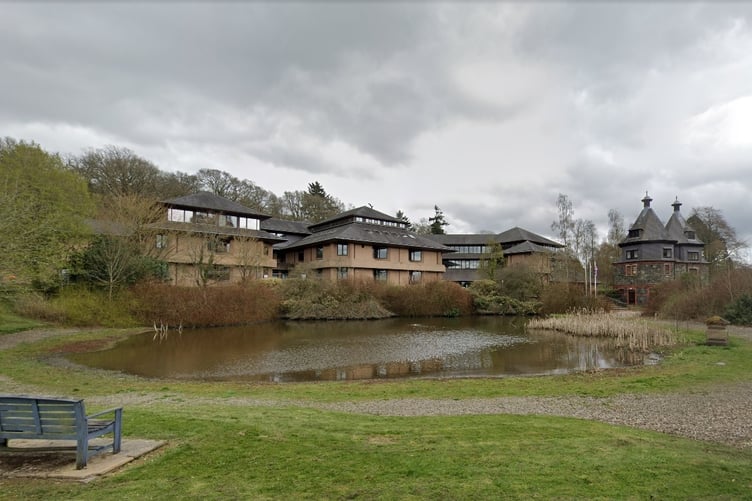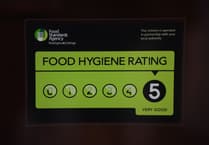Avoiding the fate of English local authorities that have gone bust, is the driving force of Sustainable Powys – which will see services centre on four towns.
At a meeting of the council’s Cabinet today (Tuesday), senior councillors debated the “principles” that will underpin the radical shake-up of services in the Powys.
It would see the county divided into four quadrants called ‘core areas’ by the council which will be centred on Brecon, Llandrindod Wells, Newtown, and Welshpool.
Director of Corporate Services, Jane Thomas explained that the council has already cut £100 million from its budget “due to austerity” over the last 10 years.
Ms Thomas is predicting budget shortfall next year of £18 million which rises to £64 million by 2028/2029 if “nothing is done”.
Ms Thomas said: “The urgency of what we face over the next five years is extremely challenging.
“We have learned from other authorities across England that have reached near failure, and that learning has helped shaped Sustainable Powys and the structure we put before you.
“Robust financial management, honest acceptance of the reality will really help us get through the challenge we face and provide the structured process to review and reshape what the council can offer into the future.”
Cabinet member for a learning Powys, Liberal Democrat, Cllr Pete Roberts said: “The reality is if we do nothing it means we have nothing.”
He added that he had spoken with Lib Dem colleagues in Woking in Surrey where the borough council went bust last year.
Cllr Roberts told his colleagues that any service area not financially “in the black,” in Woking were cut.
Cllr Roberts said: “This saw them go from several leisure centres down to one.”
He pointed out that the programme “at least” gave Powys four core areas rather than just one.
Cabinet member for future generations, Labour’s Cllr Sandra Davies said: “I’m very much aware of the financial situation, there are no easy answers.”
She wanted the recommendations split up and voted on individually as from behind closed doors briefings for councillors she acknowledged many had raised “anxious questions.”
Cllr Davies said: “The concern is to approve the four core areas.
“If we accept this what happens if this doesn’t materialise as we wish, transport is key to it all.”
She wanted more information to be “comfortable on this point.”
Legal advice given to the cabinet was against splitting up the recommendations into seperate votes.
Council leader, Liberal Democrat, James Gibson-Watt said: “We effectively already run a four hub model – the idea that we provide comprehensive services equally now is nonsense.”
Giving his “hometown” of Hay-on-Wye as an example Cllr Gibson-Watt explained that the council’s only presence there is the school.
The library is inside the school and “heavily dependent” on volunteers and the leisure centre is run by a community group.
Cllr Gibson-Watt said: “For Hay there is no real change, and I suspect for a lot of communities that is also the case.”
Cllr Gibson-Watt said that he had recently visited Birmingham – where the city council went bust last year.
Cllr Gibson-Watt said: “The commissioners have been in Birmingham swinging the financial scythe in no uncertain terms.
“The consequences of that are already visible on the streets, you will see people that have suffered sitting outside Grand Central railway station in a desperate state.
“For a country like Britain to have people on the street begging and clearly in a distressed state is a shock.
“I came away wondering what sort of country we are now living in and those are the people that will get hurt.
“This is what we are talking about here, avoiding the consequences of council services falling over.
“If we do nothing it would be catastrophic.”
He stressed that decisions were “not set in stone” and that agreeing the principles would allow all the options to be explored.
Cabinet agreed the principles with Cllr Davies abstaining, deputy council leader, Labour’s Cllr Matthew Dorrance was absent from the meeting.
What are the principles for Sustainable Powys?
Future Powys County Council (PCC) services will be centred on four towns as the authority outlines a radical shake up of provision.
Agreeing the principles of ‘Sustainable Powys’ is the first step in explaining how the council will provide its services in the future.
It will see the county divided into four quadrants called ‘core areas’ by the council which will be centred on Brecon, Llandrindod Wells, Newtown, and Welshpool.
The report explained that ‘place-based planning’ helped the council divide the county into “manageable areas for services” and for collaborating with communities and partners.
The model is already used with the council having split the county into 13 “localities” based on its market towns.
The 13 localities will be now fit into the quadrants.
The report said: “We will provide a hub in each of the four core areas – anything else will only be provided if there is an approved business case to support it.
“We will use schools and other community assets wherever we can for community-based solutions and services.
“Travel times can be up to one hour to your nearest hub even if you are a child.”
The principles explain that service provision must be “digitally supported” and public and community transport must “align” in each locality to the hub.
The other principles are:
• Being open minded and seeking innovative solutions
• Delivering best possible outcomes through transformation to provide better quality services
• Using evidence – better to understand need and model future demand
• A continual process of learning and adapting to meet existing and long-term needs.
• Engaging early with people in agreeing, designing and delivering approaches so we listen, understand, reflect and feedback
• Addressing the fundamental question: why do we do what we do?
• A strategic whole system approach, with partners, communities and the people of Powys
• Delivering outcomes that are affordable or no cost





Comments
This article has no comments yet. Be the first to leave a comment.